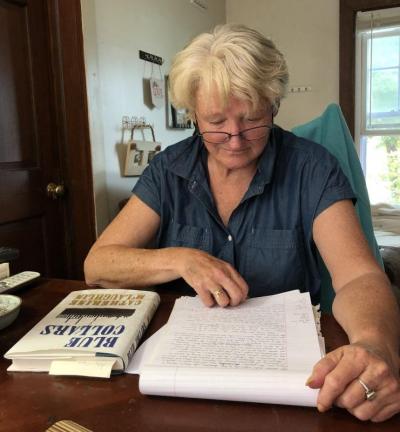Author tells of nostalgia, conflict in New Bedford in debut novel
When Catherine McLaughlin picked up a pen and began work on what would become her first published novel, the Dartmouth author knew two things: she wanted to revisit her childhood in New Bedford and tell an impactful story at the same time.
That is how Blue Collars was born. The novel, published last month by Spinner Publications, has been in the works since 2009, several years before the English professor retired from her last teaching post at Framingham State University.
While attending college herself -- paid for by working part-time as a teenager in New Bedford textile mills -- she was mentored by noted author James Baldwin, who was a writer-in-residence at the time. The lessons she learned in never leaving anything out of her writing guided her through her longhand production of the book.
Set in the South End of New Bedford in the 1950s, McLaughlin tapped into her own childhood to take a nostalgic yet uncompromising look back in time to an era when the city was thriving yet dealing with tough issues. It centers on the life of Finn Kilroy, who grows up in the tight-knit blue-collar neighborhood with her parents and siblings.
Despite the appearance of a happy, idyllic family, however, Finn harbors a dark secret, which she carries with her throughout the novel: she faces sexual abuse at the hands of a trusted family member.
“I depict a kind of ordinary working class family, and the message is abuse can happen in any family,” McLaughlin said. “In the 1950s there was really nowhere to turn -- you wouldn’t even think of calling the police.”
She turned to her own experience of sexual abuse to tell Finn’s story, focusing on long-term effects the abuse had on Finn’s personality and self-image, and the road to redemption and recovery.
“You learn about forgiveness,” McLaughlin said. “Finn faces that horrible feeling of guilt because of the case. The abuse went on for a number of years, and when it was exposed in the family the main question was ‘why didn’t you tell?’ As a 13 year old, Finn has a lot of trouble handling that question. She feels complicit, like a co-conspirator. She feels guilty.”
She also tapped into racial issues prevalent in the region and across the country at the time. She incorporates her childhood memories of unofficially segregated beaches and penny candy stores which sold racially-charged black candy liquorice near her home. In the novel, racism is explored through the eyes of Finn’s best friend, an African American girl named Connie.
“There are subtle distinctions here and there, and you don’t realize it as a kid,” McLaughlin said. “You may wonder about it but you don’t really get it, and by being friends with Connie, Finn gets it.”
The book is out now and available at local retailers and on Amazon. Reception has been positive, and the book has already sold out of its first print run. McLaughlin said she hopes to drum up publicity nationally, because it’s not just a South Coast story -- it’s a story about redemption in the face of enormous odds, and especially relevant today with recent movements like #MeToo.
In between book tours, McLaughlin is working on several additional novels that are nearing completion, and she also enjoys painting.
















